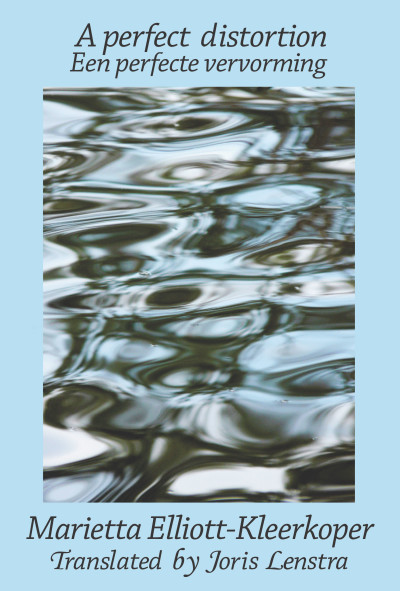
A Perfect Distortion by Marietta Elliot-Kleerkoper
Translated by Joris Lenstra
Hybrid Books, 2016
The poems in this collection are provided in the original Dutch with an English translation; two languages and cultures that are intertwined in the poet and in the poetry. The mirroring effect of the parallel texts moves the reader beyond English language egocentricity, providing a continual reminder that language is constructed and understood in a variety of ways. There is a visual engagement as well as a cognitive one in sounding out the unfamiliar words (while wishing someone would read them aloud to me) and seeing how they balance in reflection.
Elliot-Kleerkoper has taught languages and been published in Australia and the Netherlands with her first Dutch-English collection, Island of Wakefulness / Eiland van waak zaamheaid, released by Hybrid Publishers in 2006. In this collection, she takes the reader on a stroll with her, frequently with an address to the reader in second person, while pointing out the beautiful details of the world she inhabits.
Terungkerend naar het oppervlak – de spil
Je blik glijdt af naar
de weerspiegeling – het water
als thee die te lang in een pot staat
--
Returning to the surface – the fulcrum
your gaze travels into
the reflection – the water
like tea too long in the pot
(‘Vier manieren om een vijver te zien /Four ways of looking at a pond’)
Unfortunately some poems are split by pictures and so the mirroring effect is lost. While the pictures support some poems, they simply interrupt others, or seem disconnected. For example, the photo-image of ‘Een perfect vervorming / A perfect distortion’ is many pages later than the title poem that it would otherwise illustrate. When there is a clearer ekphrastic connection, the poem can change the manner of visual perception, such as ‘Waterlelie / Waterlily’:
en als je in zijn diepte staart zou je ogen zien – goedaardige kleine ogen die terugkijken oogjes van kleine visjes. Ze zullen jou voeden zolang jij ogen hebt om mee te zien -- and if you stare into its depths you’ll see eyes – benign little eyes looking back at you eyes of little fishes. They’ll nourish you as long as you have eyes to see
There is a careful attention to the arrangement of words and space in Elliot-Kleerkoper’s poetry, a meditative precision to her language. She leaves space for breathing between the images, enhancing their meditative quality.
een vlinder vast in de heldere lucht -- a butterfly held in the transparency of air (‘Vlinder’ / ‘Butterfly’)
This style of poetry Elliot-Kleerkoper does very well, far better than the formalistic requirements of the pantoum in ‘Hun eigen perfectie / Their own perfection’, which rather seems awkward and weighty in the midst of all the lightness conveyed by the rest of the collection. There are moments of shadow, such as her ‘Ode’, addressed to the ‘noble adversary’ of ‘Pain,’ where the couplets hammer in the effect just as the experience does.
Jij hebt me verrast mijn nacht geroofd en mijn onderwerping aan jouw heerschappij afgedwongen -- You surprise me thieving my night force me to submit to your regime
There are times when the writing can become overly descriptive, lacking in depth, like skimming the surface of the water that is present in so many of her poems. The long poem, ‘Seizoenen, Darebin Parklands / Seasons, Darebin Parklands’, often seems merely observational:
LENTE I Eenden scharrelen rond in het witte schuim tussen groene algen Op een bank heeft een man één witte en één groen sok aan -- SPRING I Ducks fossicking in white scum and green algae On a bench, a man wearing one white sock and one green sock
When the poetry is more than descriptive, capturing an idea as well as an engagement with the physical world, it captures the reader as well. ‘Het idee van een roos /The idea of a rose’ describes the transience of beauty:
Wat had ze graag die roos geplukt achter het hek in een alledaagse tuin maar ze kon het patron van de regendruppels niet onthouden hoe het avondlicht opgevangen werd -- She would have liked to pick the rose behind the fence – in an ordinary garden but she couldn’t preserve the way raindrops were scattered how they caught the evening light
Mostly, these are gentle poems without harsh edges, confronting images or difficult twists. They provide an opportunity to join with Elliot-Kleerhopper in discovering the beauty of the natural world and using that as a way to carry on through the pain. And to very simply appreciate the crafting of words in two languages that echo and enhance each other.













